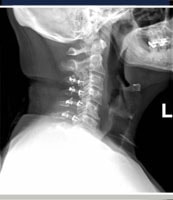Cervical Spine Surgery in Boston, MA
What is the Cervical Spine?
The cervical spine is the part of your spinal column that attaches your skull to the start of your back. This group of seven bones (C1 – C7 vertebrae) make up the neck area. Because it performs several crucial functions, pain to this area can be debilitating.

What does the Cervical Spine do?
In order to better understand how certain conditions can affect you, it is helpful to learn exactly what the cervical spine does.
- Holds and Protects Spinal Cord. The spinal cord is extremely delicate and must be protected. Since it relays messages to and from the rest of the body, the cervical spine’s function is essential.
- Supports the Head and Allows Movement. All while supporting approximately 10 pounds, It allows you to move your head forward, backward, and side to side. A decrease in mobility could greatly hinder your day-to-day function.
- Allows Blood Flow to the Brain. The cervical spine has openings that allow arteries to pass blood to the brain.
What Cervical Spine Pain May Mean
Neck pain can be debilitating and there is a wide range of possible causes. The most common conditions that affect this area include:
Cervical Degenerative Disc Disease
The discs between each vertebrae act as shock absorbers. As we age, these discs can dry out and become thin. The degeneration of tissue in the neck area is far less common than the lower back since it does not carry as much weight. Eventually, cervical degenerative disc disease could lead to cervical stenosis.
Most commonly, this condition results in a stiff neck. It may also result in numbness in the hands and arms. Many cases of cervical degenerative disc disease can be successfully treated with conservative care. Physical therapy, exercise, chiropractic adjustment and prescription medication can help to improve this issue. If symptoms do not go away after six months of treatment, surgery may be required.
Cervical Stenosis
Most common in those over 50, degeneration of the tissue between and around the vertebrae can become thin and weak, causing the spinal canal to become thinner. When this happens, nerves and the spinal cord may become pinched.
This condition can cause neck pain/stiffness, arm pain, weakness in the hands, muscle spasms, loss of coordination and sometimes loss of bowel or bladder control. Mild cases of cervical stenosis can be treated over time, but more severe issues may require surgery.
Cervical Fracture
Most commonly known as a broken neck, a cervical fracture is the result of some sort of trauma. Many of these injuries come from sports mishaps and car accidents. A cervical fracture should be handled delicately due to the potential risk of decreased motor function or even paralysis.
Those with an acute neck injury may not have severe neck pain, but the neck, shoulders and arms could all potentially be affected. In instances of a minor fracture, a brace will be worn for over a month until the bone heals. More serious fractures could result in surgery and three months in a cast.
Cervical Kyphosis
A normal cervical spine will be slightly curved forward when viewed from the side. Kyphosis is the curvature of the spine that is the opposite of the normal curve. The more pronounced the curve is, the more issues it can cause. Cervical kyphosis can occur as a birth defect, or it may develop as a result of degenerative disc disease or trauma.
Minor cases of cervical kyphosis can result in discomfort and slightly limited function. More severe instances of cervical kyphosis can cause neurological defects, dramatically limited movement and chronic pain. If the deformity is the result of a birth defect, early surgical intervention may be recommended. In cases caused by degenerative disc disease or trauma, a specialist may recommend physical therapy or surgery depending on several factors.
Advances in the surgical treatment of conditions of the cervical spine over the past decade have continued to improve our ability to relieve pain and improve or preserve neurologic function. Advances in radiologic imaging methods, improved surgical techniques and modern spinal instrumentation have all contributed to our ability to more precisely and safely address the cause of a patients pain and disability. At Boston Spine Surgery we are able to implement the latest proven technologies and treatments to address your condition.
Cervical Spine Conditions Treated at Boston Spine Surgery
Some conditions of the cervical spine which we treat:
- cervical radiculopathy / neck and arm pain
- cervical disc herniation
- cervical spondylosis
- cervical stenosis / myelopathy
- cervical instability
- fractures, tumors and infections of the cervical spine
Some types of surgery of the cervical spine we perform:
- anterior cervical discectomy and fusion
- anterior cervical corpectomy
- posterior cervical foraminotomy
- cervical laminoplasty
- cervical instrumentation and fusion
- cervical disc replacement
Cervical Spine Surgery Consultations in Boston, MA
To request an appointment with Dr. Frank Pedlow at his office in Boston, MA for cervical spine surgery, call (617) 227-9300.



